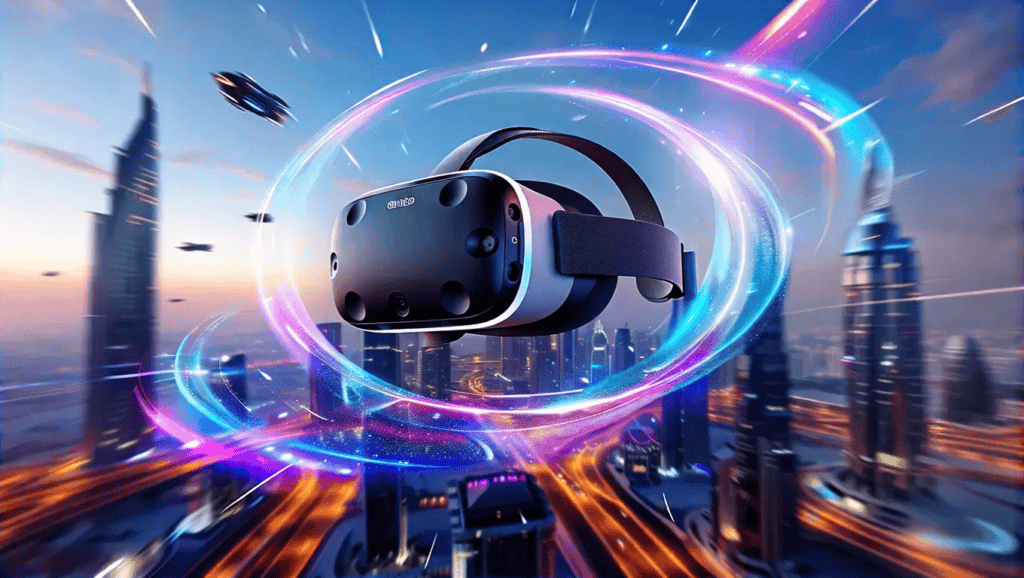Introduction
Virtual Reality (VR) has come a long way since its early days as a science fiction concept. Today, it stands as one of the most exciting frontiers in gaming technology, offering players immersive experiences that were once the stuff of dreams. As VR continues to evolve, it’s poised to reshape the gaming industry in profound ways.
The Current State of VR Gaming
VR gaming has rapidly grown from a niche market to a thriving segment of the gaming industry. With the success of devices like the Oculus Rift, HTC Vive, and PlayStation VR, more gamers are stepping into virtual worlds than ever before. These platforms have not only popularized VR but have also set the stage for more advanced and accessible technologies.
Current VR games like Half-Life: Alyx, Beat Saber, and Superhot VR have demonstrated the potential of the medium, blending engaging gameplay with immersive environments. These games showcase how VR can elevate traditional gaming experiences by allowing players to interact with game worlds in entirely new ways.

Technological Advancements Driving VR
The future of VR gaming is closely tied to advancements in technology. Companies are continuously working on improving VR hardware, making it more comfortable, affordable, and powerful. Key developments include:
- Higher Resolution Displays: Newer VR headsets are moving towards 4K and even 8K resolution, offering clearer and more realistic visuals.
- Wireless Freedom: The next generation of VR headsets is focusing on wireless capabilities, eliminating the need for cumbersome cables and enhancing mobility.
- Haptic Feedback: Advances in haptic technology allow players to feel sensations within the game, such as the impact of a punch or the texture of an object, making the experience even more immersive.
- Eye Tracking: This technology enables more natural interactions within VR environments by allowing the game to respond to where the player is looking.
The Impact of VR on Game Design
As VR technology advances, game design is also evolving to make the most of what VR has to offer. Traditional game mechanics are being reimagined for VR, leading to new genres and gameplay experiences.
For example, VR has popularized the concept of room-scale gaming, where players physically move around their environment to interact with the virtual world. This has given rise to titles like Boneworks and The Walking Dead: Saints & Sinners, which emphasize physical interaction and exploration.
Additionally, VR is fostering innovation in storytelling. Games like Lone Echo and Moss offer narratives that are deeply intertwined with their immersive environments, making players feel like they are part of the story rather than just observers.
The Social Aspect of VR Gaming
VR is also changing how players connect with each other. Social VR platforms like VRChat and Rec Room allow users to create and share experiences in virtual spaces, blending gaming with social interaction. This has opened up new possibilities for multiplayer gaming, where the sense of presence in a shared space can make interactions more meaningful and fun.
As VR technology becomes more widespread, we can expect to see more social VR experiences that bring players together in innovative ways, from cooperative gameplay to virtual gatherings and events.
Challenges and the Road Ahead
Despite its rapid growth, VR gaming still faces challenges that need to be addressed. The high cost of VR hardware remains a barrier for many potential users, though prices are gradually decreasing. Motion sickness and physical discomfort can also be issues for some players, but ongoing improvements in VR technology aim to mitigate these problems.
Looking ahead, the future of VR gaming is bright. As technology continues to advance, VR will become more accessible, and game developers will have new tools to create even more immersive and engaging experiences. The line between the virtual and real worlds will continue to blur, offering gamers unprecedented opportunities to explore, play, and connect.
Conclusion
Virtual Reality is not just a passing trend; it’s a transformative force in the gaming industry. As VR technology evolves, it will continue to redefine what is possible in gaming, offering experiences that are more immersive, interactive, and social than ever before. The future of VR gaming is filled with endless possibilities, and we’re only just beginning to scratch the surface of what this technology can achieve.
01 November 2024 Neural Earbuds: Are We Ready for Headphones that Read Our Minds?
10 August 2024 The Future of Virtual Reality: How VR is Changing the Gaming Landscape
10 August 2024 The Indie Game Revolution: Why Independent Developers are Dominating the Scene
24 November 2023 Shadows of Hyrule: A Dark Fantasy Odyssey through A.I.-Generated Art in The Legend of Zelda
24 November 2023 Stoicism on TikTok: The Unexpected Renaissance of Wisdom for the Modern Man
22 November 2023 Cowboy Bebop: A Galactic Masterpiece vs. Netflix’s Stellar Flop
22 November 2023 The McLegal Fiasco: Jamie Oliver’s Alleged Triumph Over ‘Toxic’ McDonald’s
22 November 2023 Silver Surfer’s Gender Swap: A Cosmic Catastrophe Marvel Fans Will Never Surf Past
16 November 2023 Walt’s Worst Nightmare: Mickey’s Dance Moves Leave Fans Wishing Upon a Different Star!
14 November 2023 A long time ago in a reality far, far away…


